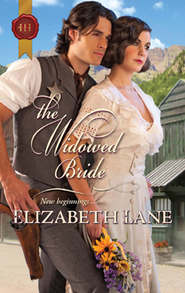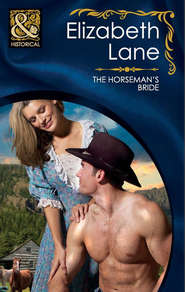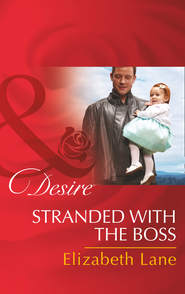По всем вопросам обращайтесь на: info@litportal.ru
(©) 2003-2025.
✖
Apache Fire
Настройки чтения
Размер шрифта
Высота строк
Поля
“In a minute.” She unfolded a linen napkin from the tray and spread it over his lap to protect the bedding from spills.
“You’re being awfully good to me, Mrs. Colby,” he ventured. “Why?”
She glanced up sharply. “Maybe I’m curious. Or maybe I just like a good story, and I do intend to get one, you know.” Her answer was flippant, almost careless, but her trembling hands jiggled the spoon in its bowl as she lifted the tray and set it across his legs. She was still afraid of him, Latigo calculated, even though she was trying her damnedest not to show it. Colby’s widow had courage, he conceded, for a white woman.
Dizzy with hunger, Latigo took the spoon awkwardly in his right hand and dipped it into the soup broth.
“It’s all right,” he muttered, determined that she would not see him spill. “Go about your business. I’ll manage fine.”
She waited in stubborn silence. When she did not leave, he focused his attention on raising the spoon to his mouth. But it was no use: he was as weak as a newborn colt. The soup dribbled from the shaking spoon and splattered back into the bowl.
“Here.” Her warm fingertips brushed his knuckles as she slipped the spoon from his hand. Latigo watched uneasily as she picked up the bowl and raised it close to his face.
“Don’t worry,” she said with an air of crisp bravado. “I’m an old hand at this. I had to feed John this way for four months before he…passed away.”
She dipped into the soup and thrust the first spoonful between Latigo’s parted lips. The delicious warmth trickled down his throat, jolting his deprived system to ravenous hunger. He gulped eagerly, noisily, shamelessly, as fast as she could spoon the precious liquid into his mouth.
She fed him with a practiced efficiency, but he could not help noticing that her hand trembled as she raised the spoon to his lips. Her gaze flickered away at every meeting of their eyes. Was she truly afraid of him or only repelled by his dark Apache features? Latigo could not be sure. He only knew that winning her trust would be like gentling a high-strung mustang mare. He would have to approach her gently and cautiously, and he could make no false or sudden moves that would startle her away.
Meanwhile, there was food and warmth and beauty here, and he could not resist savoring it all. Latigo filled his belly with nourishment and his eyes with the sight of Rose Colby, and little by little, he began to feel like a man again.
Rose put the bowl and spoon down on the tray, shaken by Latigo’s darkly intense gaze. “You can manage the rest,” she said, breaking off a hunk of bread and sopping it in the dregs of the broth. “Here—you’re going to be fine. I can tell you’re already feeling better.”
He accepted the bread in his elegantly long fingers, eating slowly now that the worst of his hunger had been slaked. “I’m obliged to you, Rose Colby,” he said. “And now, if you have any common sense, you’ll fetch my boots and clothes and give me leave to ride out of here.”
“You’re not strong enough yet,” she said. “You wouldn’t last an hour in the saddle.”
“Why should you care? I’ve invaded your home, held you at gunpoint, been as surly as a three-legged coyote with the mange—”
“I care because you saved John—at least that’s what you claim.” Rose caught the dark flash of his eyes. “If you’re telling the truth, I owe you for my son’s life as well as my husband’s.” She exhaled nervously. “I want you to tell me how it happened.”
Latigo had finished his meal. A twinge of pain flickered across his face as he sank back against the pillows. Rose stood up, lifted the tray from his lap and placed it on the nightstand, her breast brushing his shoulder when she leaned over him. Her face felt prickly hot as she lowered herself onto the edge of the chair. “Go on,” she said. “I’m waiting.”
“Do you want the pretty version of the story, or do you want the truth?” His hard eyes glittered with irony. A dark knot of premonition tightened in the pit of Rose’s stomach.
“Tell me the truth,” she said.
“You may not like it.”
“Go on. Tell me how you met John, and how you saved him.”
A cactus wren piped its evening song through the open window. Latigo hesitated, swallowed, then spoke slowly into the silence that followed.
“Your husband’s company had a reputation for fighting Apaches who couldn’t fight back,” he began, his voice as expressionless as book print. “Old ones, young ones, women—it didn’t matter as long as they were Apaches. This time they’d been chasing a bunch of Diablo’s squaws they’d spotted out foraging in the brush. They’d followed the women up a box canyon, bent on Lord knows what—”
“No!” Rose burst out in spite of her resolve to listen. “That can’t be true! John’s militia fought armed Apaches on the warpath! He was a hero. He was even awarded a medal by the territorial governor. I have it upstairs.”
“You wanted the truth.” His eyes had narrowed to piercing slits. “Do you have the courage to hear it?”
Rose stared down at her clenched hands, passionately wishing she had never asked him to tell her this story, wishing she had sent him on his way to take his chances in the desert.
“Go on,” she said, willing her voice to be as emotionless as his.
Latigo exhaled sharply. “One of the men in the company told me what happened. They’d managed to kill one woman and wound her baby when Diablo and his braves started shooting from the rocks above. The women scattered, and the Apaches blocked off the mouth of the canyon with a rockslide they’d rigged. By the time we came along, they had your husband’s company pinned down with rifle fire and were closing in to finish them off.”
Rose listened numbly, her hands clenched in her lap. The story was preposterous, of course, she told herself. John Colby had been a brave and chivalrous man, while this Latigo had shown her no sign of being anything but a lying desperado.
“I was leading a scouting party two hours ahead of the main column,” he continued in the same dispassionate tone. “We heard shots and guessed what had happened. There were only four of us, and we knew there was no time to get help. But one thing was in our favor—I knew the country, and I’d been in that canyon before. There was a way out, a side branch, hidden by rocks. The other scouts set fires to create a diversion while I went in after the trapped men. I had to save them. It was my job.”
“And you led them out, I suppose. You saved John and the whole company all by yourself.” Rose’s pulse hammered as she challenged him. “You’re lying!” she snapped.
“Lying?”
“John would never have pursued a band of helpless women and babies! And your story—it’s too neat, like something out of a dime novel! You didn’t save my husband’s life or anyone else’s! You’re making it all up so I’ll feel obligated to—”
The blaze of cold fire in his eyes shocked her into silence. “Your husband was wounded when a bullet grazed his left thigh,” he said. “I bandaged it myself. The wound wasn’t deep, but it would have left a scar.”
“No, you couldn’t possibly…” Rose remembered the raw, pink groove, newly healed, along John’s upper left leg. She had seen it whiten with time. She had touched it every day as she tended his all-but-lifeless body.
“Listen to me, Rose Colby.” The last rays of the dying sun blazed their reflected fire in his eyes. “I don’t know where you were during the Apache wars, but nothing about that time was noble or heroic. It was dirty and bloody and just plain, damned awful, and each side was as bad as the other.”
“My parents were massacred by Apaches,” Rose whispered, gazing out the window at the bloodred sky. “We were on the way to Prescott, and I’d left our camp to gather some nopales. I came back just in time to see them die. John’s company found me the next day, wandering through the brush, half out of my mind.”
He stared at her as if seeing her for the first time. “I’m sorry,” he said. “I didn’t know.”
“You were part of it, too,” she lashed out at him. “You were with the army, fighting against your own people. If things were as bad as you claim, why didn’t you leave?”
Something hard slipped into place behind his eyes. “Let’s just say that I had nowhere else to go.”
Chilled by the cold finality in his voice, Rose stood up and reached for the tray. “You can rest the night here. I’ll give you breakfast in the morning and enough food and water to get you to the mountains.”
“And a gun. I’ll find some way to pay you for it.”
“You can have some of John’s old clothes,” she continued, ignoring his demand. “They should fit well enough. I had to burn yours, except for the boots—” “You’re not listening to me, Rose.”
Her breath caught at his use of her given name. “No,” she said. “No gun. Supplies are one thing, but what if I’m wrong about you? What if you really murdered those two men? How can I, with any good conscience, give you the means to kill others?
“Anyway, your story doesn’t make sense to me.” Rose paused in the doorway, the tray balanced on her hip. “Why should white men ride onto the Apache reservation and shoot down agents from their own government?”
“Does it make any more sense to you that I would shoot them?” he asked. “I was responsible for their safety! I would have been the first one blamed.”
“Unless you’d somehow managed to be shot along with them.”
“From behind?”
Rose had no answer for that. She set the tray on the kitchen table and turned back toward the door, still hesitant. Lock him in and walk away, her common sense argued. She had already heard enough of this stranger’s talk to shake her world.
“Was there something else you wanted?” he asked.











